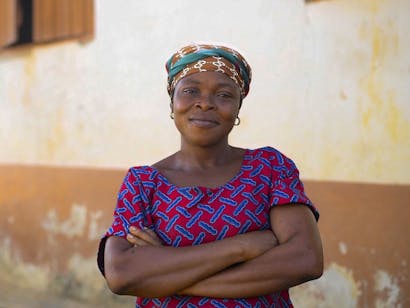It takes all of us to put an end to GBV

Gender-based violence (GBV) is an epidemic worldwide. Anyone can experience GBV – young, old, rich, poor, men, women – but women and girls are disproportionately affected. Estimating the prevalence of GBV worldwide is difficult because it is chronically underreported, but estimates vary from 33 to 70 percent of women in their lifetimes experience GBV. But there is good news: the tolerance for such violence is decreasing, and governments are becoming more deliberate and active in taking measures to address GBV in their countries. Multilateral actors and INGOs, such as CARE, have been key actors and tremendous advocates for putting laws in place and taking not only reactive, but proactive steps in eliminating GBV. This is the story of two such experiences in Burundi and Rwanda.

Today, 10 December, Human Rights Day, is the final day in the annual international campaign: 16 Days of Activism against Gender-Based Violence. This campaign begins by marking the International Day for the Elimination of Violence against Women (25 November) until today (10 December), Human Rights Day. The 16 Days of Activism is a platform for INGOs and civil society to raise their unified voices and galvanise advocacy efforts to call for the elimination of GBV.
Requirements for real change
This campaign aligns with CARE’s approach to ending GBV. CARE understands that advocating for change in public policies and laws is not enough; real change requires support for their effective implementation. CARE utilises the POWER! Model to amplify lobby and advocacy impact. This systems model recognises power at multiple levels: individual and household, community, local duty-bearers, and national and international actors.

A different approach
The Every Voice Counts programmes in CARE Burundi and CARE Rwanda have taken the charge every year in collaboration with local partners. Our approach is different: through alliances with local partners, CARE brings in and amplifies more voices of women and girls experiencing GBV. And amplified voices are not enough: together with local partners and allies, we feed these voices directly into conversations with local and national authorities through different spaces of dialogue like our Community Score Card and provincial and national advocacy events. Only by engaging different actors both locally and nationally can evidence-based advocacy result into sustainable, positive changes.
Showcasing successes and challenges
In Burundi, CARE and partners have been very active in direct lobby and advocacy with the national government to make the necessary amendments to the GBV policy. A learning document was created to showcase the successes and challenges of key interventions. CARE Rwanda and partners have also been active advocates with the national government as the GBV policy is being considered for revision. A policy analysis was generated to support the government in updating the policy.
What have we learned from Burundi and Rwanda? First and foremost, laws and policies to eliminate GBV may be in place, but the implementation of the policies may often lag behind. This could be due to competing priorities in budgets, limited capacities of service providers, limited or lacking accountability mechanisms, and/or contradictory provisions in other policies that hold up implementation, amongst other reasons.
Difference in laws
The case of contradictory provisions has been found in Burundi, so the CARE team and partners conducted research on all of the implementation gaps and contradictory provisions preventing implementation. One example of what was found is that Burundi’s Person and Family Code only allows those who experienced the GBV themselves to report it, while the GBV law allows anyone who knows of GBV occurring to report. The research, alongside coordinated social learning for women Parliamentarians and Ministry administrators with people who have experienced GBV and suffered due to poor policy implementation, has resulted in direct input into the amendment of the national GBV policy.
Implementation
In Rwanda, the CARE team and partners have been focusing lobby and advocacy efforts on policy implementation coordination, resourcing, and outreach. In looking at the gaps in the current GBV policy, it is evident that the decentralised governance processes in Rwanda make it challenging to coordinate the many stakeholders responsible for different components of policy implementation; stronger coordination mechanisms and improved monitoring and evaluation would enhance policy implementation. Further, the allocation of adequate resources and budget in terms of dedicated funds for GBV efforts in national and district plans and budgets, funding to critical services such as health and legal services, and more capacity strengthening for public servants, CSOs and volunteers would greatly aid in implementation.
The examples set by both countries highlight some key learnings around GBV advocacy.
- First, evidence is powerful. The importance of evidence-based advocacy cannot be understated. Data and support from the community help to make a compelling case.
- Next, alliances are essential. Building a network and shaping alliances between civil society partners builds a unified voice toward GBV policy reform and better utilises the strengths of different partners.
- Also, knowing who has power and influence amongst decision-makers is important.. Conducting power analyses can help identify who should be key targets for advocacy efforts.
- Work on building positive relationships through both informal and formal engagement with powerholders and decision-makers. For instance, Burundi and Rwanda are utilising innovation hubs to create spaces for dialogue between government officials and women and girls in an ideation and prioritisation processes.
- Finally, stay in it for the long-term. Advocacy is a long-term intervention and sustainability mechanisms to keep the momentum going are needed from the outset.
This blog was based on a policy analysis in collaboration with CARE Rwanda and learning document in collaboration with CARE Burundi. Every Voice Counts is a project of CARE Nederland, funded by the Dutch Ministry of Foreign Affairs.


